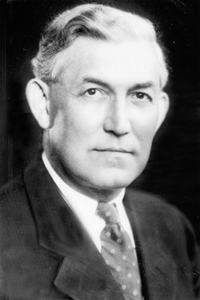
In number theory, a Carmichael number is a composite number , which in modular arithmetic satisfies the congruence relation:

Robert Daniel Carmichael was an American mathematician.
In number theory, the continued fraction factorization method (CFRAC) is an integer factorization algorithm. It is a general-purpose algorithm, meaning that it is suitable for factoring any integer n, not depending on special form or properties. It was described by D. H. Lehmer and R. E. Powers in 1931, and developed as a computer algorithm by Michael A. Morrison and John Brillhart in 1975.

Hans Lewy was a Jewish American mathematician, known for his work on partial differential equations and on the theory of functions of several complex variables.
Leonard Eugene Dickson was an American mathematician. He was one of the first American researchers in abstract algebra, in particular the theory of finite fields and classical groups, and is also remembered for a three-volume history of number theory, History of the Theory of Numbers. The L. E. Dickson instructorships at the University of Chicago Department of Mathematics are named after him.
In number theory, Proth's theorem is a primality test for Proth numbers.

Derrick Norman Lehmer was an American mathematician and number theorist.
In mathematics, Carmichael's totient function conjecture concerns the multiplicity of values of Euler's totient function φ(n), which counts the number of integers less than and coprime to n. It states that, for every n there is at least one other integer m ≠ n such that φ(m) = φ(n). Robert Carmichael first stated this conjecture in 1907, but as a theorem rather than as a conjecture. However, his proof was faulty, and in 1922, he retracted his claim and stated the conjecture as an open problem.
In mathematics, the Pocklington–Lehmer primality test is a primality test devised by Henry Cabourn Pocklington and Derrick Henry Lehmer. The test uses a partial factorization of to prove that an integer is prime.
In mathematics, a modular invariant of a group is an invariant of a finite group acting on a vector space of positive characteristic. The study of modular invariants was originated in about 1914 by Dickson (2004).
Otto Franz Georg Schilling was a German-American mathematician known as one of the leading algebraists of his time.

Hans Frederick Blichfeldt (1873–1945) was a Danish-American mathematician at Stanford University, known for his contributions to group theory, the representation theory of finite groups, the geometry of numbers, sphere packing, and quadratic forms. He is the namesake of Blichfeldt's theorem.
Isidore Isaac Hirschman Jr. (1922–1990) was an American mathematician, and professor at Washington University in St. Louis working on analysis.
Arthur Sard was an American mathematician, famous for his work in differential topology and in spline interpolation. His fame stems primarily from Sard's theorem, which says that the set of critical values of a differential function which has sufficiently many derivatives has measure zero.
Moderne Algebra is a two-volume German textbook on graduate abstract algebra by Bartel Leendert van der Waerden, originally based on lectures given by Emil Artin in 1926 and by Emmy Noether (1929) from 1924 to 1928. The English translation of 1949–1950 had the title Modern algebra, though a later, extensively revised edition in 1970 had the title Algebra.
The Canon arithmeticus is a set of mathematical tables of indices and powers with respect to primitive roots for prime powers less than 1000, originally published by Carl Gustav Jacob Jacobi (1839). The tables were at one time used for arithmetical calculations modulo prime powers, though like many mathematical tables they have now been replaced by digital computers. Jacobi also reproduced Burkhardt's table of the periods of decimal fractions of 1/p, and Ostrogradsky's tables of primitive roots of primes less than 200, and gave tables of indices of some odd numbers modulo powers of 2 with respect to the base 3.
In mathematics, Lehmer's totient problem asks whether there is any composite number n such that Euler's totient function φ(n) divides n − 1. This is an unsolved problem.
Burton Wadsworth Jones was an American mathematician, known for his work on quadratic forms.

Harris Hancock was a mathematics professor at the University of Cincinnati who worked on algebraic number theory and related areas. He was the brother of the horse breeder Arthur B. Hancock.
Robert McDowell Thrall (1914–2006) was an American mathematician and a pioneer of operations research.






